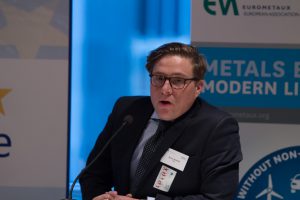Working Breakfast EU Regulation on Conflict Minerals: working towards an effective solution
On 20th January 2015, MEP Iuliu Winkler, Vice-Chair of the Committee for International Trade, hosted a Working Breakfast on the topic “EU Regulation on Conflict Minerals: Working towards an effective solution”. The event was attended by over 100 stakeholders, and also included presentations from Guy Thiran (Eurometaux), Signe Ratso (European Commission), Marius Baader (German Automobile Association) and Luisa Santos (Business Europe). MEP Winkler introduced the topic of conflict minerals by highlighting several important proposals.
This included for example the necessity of strong and effective accompanying measures on the ground, the need for clarity on the definition of conflict areas, introduction of the importers list, the need for a new European authority, and the creation of strong mechanisms under the review clause.
Keynote Speeches
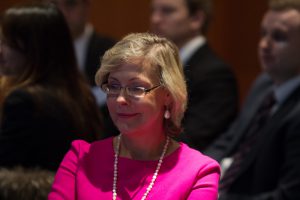
Signe Ratso, Director of DG Trade Strategy and Analysis, Market access – European Commission
Ms. Signe Ratso, Director of DG Trade Strategy and Analysis, Market access, gave a statement that
introduced the main principles of the European Commission’s proposal. Following a strong call from
the European Parliament, in March 2014 the Commission proposed a voluntary EU system of selfcertification
for importers of tin, tantalum, tungsten and gold who choose to import responsibly into
the EU. The EU proposal is in line with the OECD voluntary Due Diligence Guidance for Responsible
Supply Chains of Minerals from Conflict-Affected and High-Risk Areas.
Ms. Ratso mentioned that EU companies are interested in responsible sourcing, and mentioned the
necessity of introducing accompanying foreign policy measures for improving the situation on the
ground. She noted that the introduced 3 years review clause will be an important mechanism to
evaluate the effectiveness of the EU Regulation. Speaking about the broader agenda, she highlighted
that the implementation of the COSME-Programme will aim to help Small and Medium Enterprises
to cope with the Regulation’s requirements.
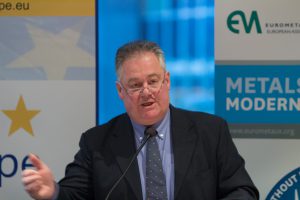
Guy Thiran, Director General – Eurometaux
In the second keynote speech, Mr. Guy Thiran stressed the non-ferrous metals industry’s support for
the objective of moving towards increased transparency in trade of minerals with conflict-affected
areas, and their concern for the human rights situation. Regarding this subject, Eurometaux’s
primary objective is to reach an effective and workable solution that does not put the
competitiveness of European industry at risk.
Mr. Thiran noted that many companies are already actively involved in a number of sector-specific
programmes, which head towards the implementation of more transparency along their supply
chains. Despite the complexities involved with such initiatives, there is a strong positive trend in
terms of participation. For example, 134 smelters or refiners have been validated with the Conflict
Free Smelter Programme, demonstrating its effectiveness. Thus, Mr. Thiran emphasised the
importance of the EU’s self-certification scheme recognising these already existing industry
programmes. Following the same logic, Mr. Thiran stressed that the EU system should ensure consistency with the
already existing US Dodd-Frank Act. Regarding more specific points, recycled materials should also
be specifically exempted from the Regulation’s requirements, as it is technically impossible to trace
the source of the original materials. In addition, Mr. Thiran underlined the need for the Commission
to introduce a defined list of conflict areas, something also supported by other speakers.
Statements
Marius Baader, Head of Department Markets, Analyses Raw Materials, Statistics – German
Association of the Automotive Industry (VDA).
In his supporting statement, Mr. Marius Baader pointed out the necessity of introducing concrete
and effective foreign policy and development co-operation activities in conflict-affected areas, in
order to make the EU system effective, He asked the question why and how a mandatory regulation
should improve and develop the current situation in the conflict regions.
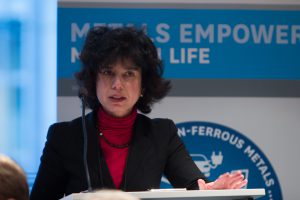
Luisa Santos, Director of International Relations – BUSINESSEUROPE
Ms. Santos clarified that a single regulation could not solve the problem, with NGOs and producing
companies also requiring measures that focus on the developmental pillar. She continued to clarify
areas that should be further clarified in order for the system to be less burdensome for companies.
These areas include clarifying definitions – for example of the ‘conflict-affected and high-risk areas’,
ensuring a harmonised implementation at the level of Member States and specifying how the
‘performance clause’ on public procurement requirements will work in practice.
Ms. Santos closed her speech by mentioning the need to implement measures that will help SMEs to
cope with due-diligence obligations.
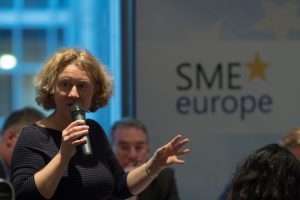
MEP Judith Sargentini – European Greens
MEP Judith Sargentini provided her position that the current EU draft proposal does not contain
enough incentives for smelters. In addition, she added that it is necessary to have a product-based
approach, in order to have the system efficient and to create a level-playing field with third
countries.
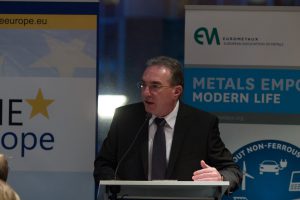
Closing remarks
After a productive question and answer session, MEP Winkler closed the breakfast by stressing the
importance of ensuring an effective and pragmatic approach, with an additional focus on ensuring
good governance and capacity building within conflict-affected areas. Only clear guidelines,
definitions and measurements will allow the legislation to reach its goal.
All photos of the event:

